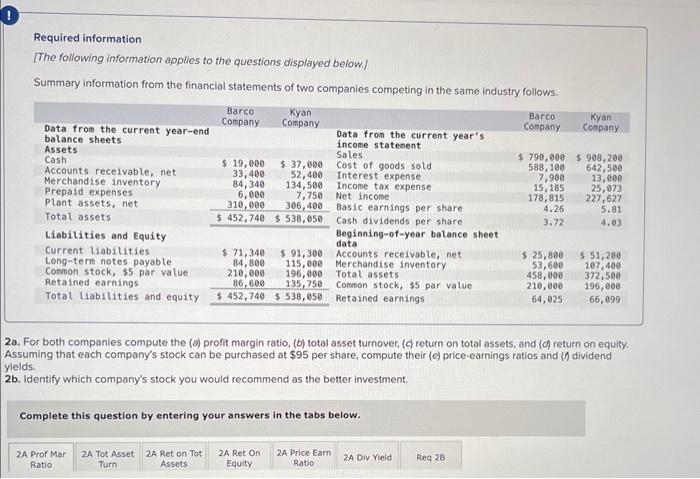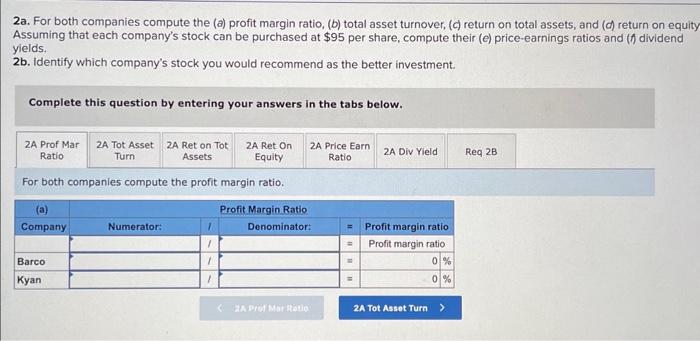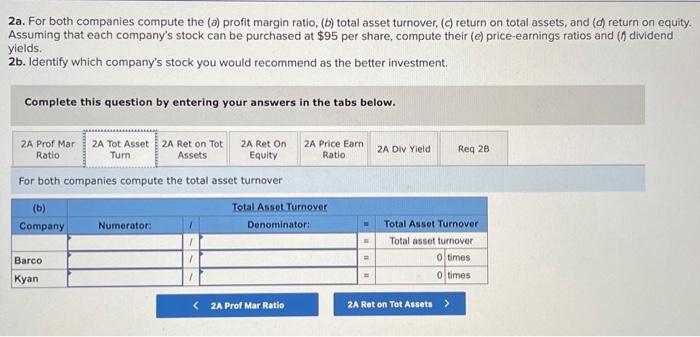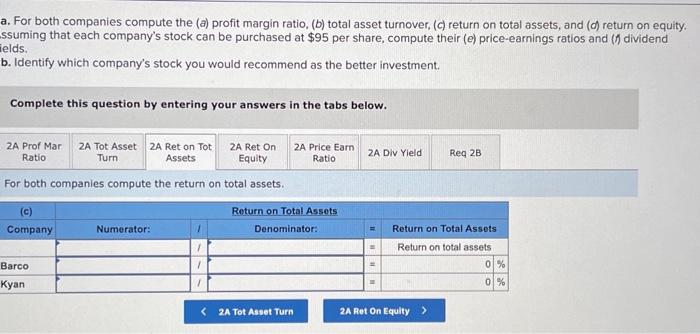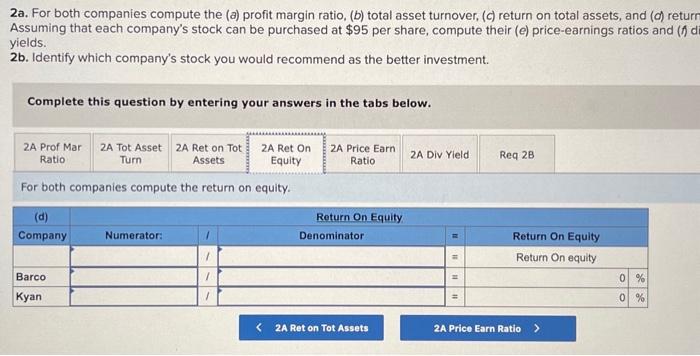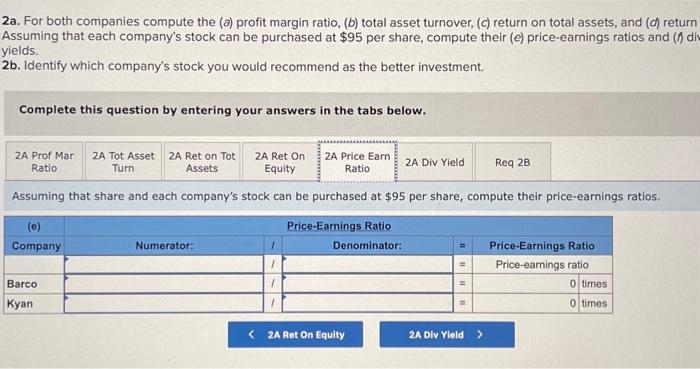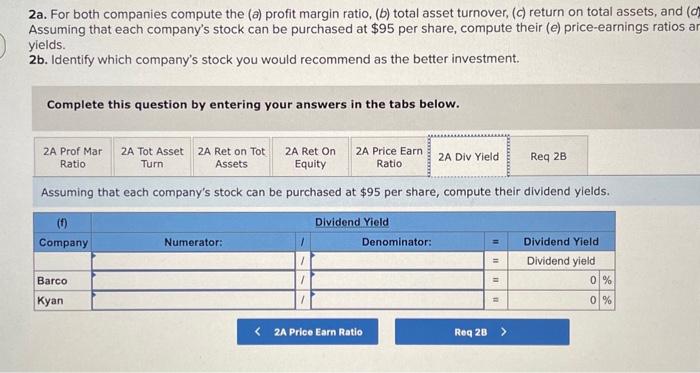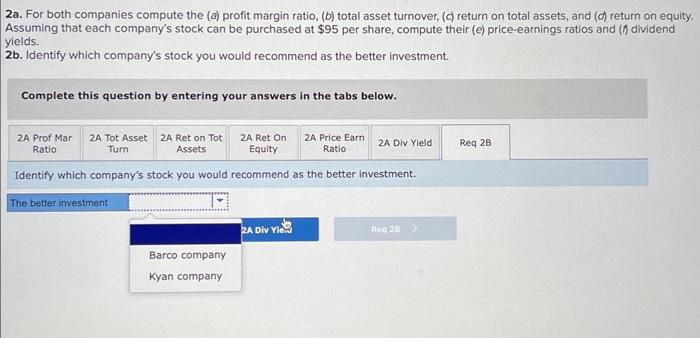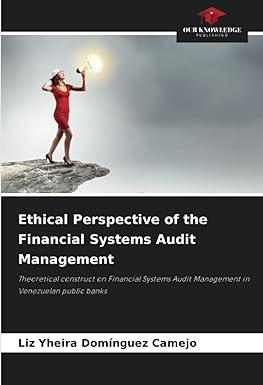Required information [The following information applies to the questions displayed below.] Summary information from the financial statements of two companies competing in the same industry follows. 2a. For both companies compute the (a) profit margin ratio, (b) total asset turnover, ( c return on total assets, and (d) return on equity. Assuming that each company's stock can be purchased at $95 per share, compute their (e) price-earnings ratios and (h) dividend yields. 2b. Identify which company's stock you would recommend as the better investment. Complete this question by entering your answers in the tabs below. 2a. For both companies compute the (a) profit margin ratio, (b) total asset turnover, (c) return on total assets, and ( ( ) return on equit) Assuming that each company's stock can be purchased at $95 per share, compute their (e) price-earnings ratios and ( f ) dividend yields. 2b. Identify which company's stock you would recommend as the better investment. Complete this question by entering your answers in the tabs below. For both companies compute the profit margin ratio. 2a. For both companies compute the (a) profit margin ratio, (b) total asset turnover, ( ( ) return on total assets, and (d) return on equity. Assuming that each company's stock can be purchased at $95 per share, compute their (e) price-earnings ratios and ( ) dividend yields. 2b. Identify which company's stock you would recommend as the better investment. Complete this question by entering your answers in the tabs below. For both companies compute the total asset turnover a. For both companies compute the (a) profit margin ratio, (b) total asset turnover, ( ( ) return on total assets, and (d) retum on equity. ssuming that each company's stock can be purchased at $95 per share, compute their (e) price-earnings ratios and ( ( dividend elds. b. Identify which company's stock you would recommend as the better investment. Complete this question by entering your answers in the tabs below. For both companies compute the return on total assets. 2a. For both companies compute the (a) profit margin ratio, (b) total asset turnover, (c) return on total assets, and ( ( ) return Assuming that each company's stock can be purchased at $95 per share, compute their (e) price-earnings ratios and (f)d yields. 2b. Identify which company's stock you would recommend as the better investment. Complete this question by entering your answers in the tabs below. For both companies compute the return on equity. 2a. For both companies compute the (a) profit margin ratio, (b) total asset turnover, (c) return on total assets, and (d) return Assuming that each company's stock can be purchased at $95 per share, compute their (e) price-earnings ratios and ( f ) di pields. 2b. Identify which company's stock you would recommend as the better investment. Complete this question by entering your answers in the tabs below. 2a. For both companies compute the (a) profit margin ratio, (b) total asset turnover, (c) return on total assets, and Assuming that each company's stock can be purchased at $95 per share, compute their (e) price-earnings ratios a yields. 2b. Identify which company's stock you would recommend as the better investment. Complete this question by entering your answers in the tabs below. Assuming that each company's stock can be purchased at $95 per share, compute their dividend yields. 2a. For both companies compute the (a) profit margin ratio, (b) total asset turnover, ( ( ) return on total assets, and ( d ) return on equity. Assuming that each company's stock can be purchased at $95 per share, compute their (e) price-earnings ratios and ( f ) dividend yields. 2b. Identify which company's stock you would recommend as the better investment. Complete this question by entering your answers in the tabs below. Identify which company's stock you would recommend as the better investment
